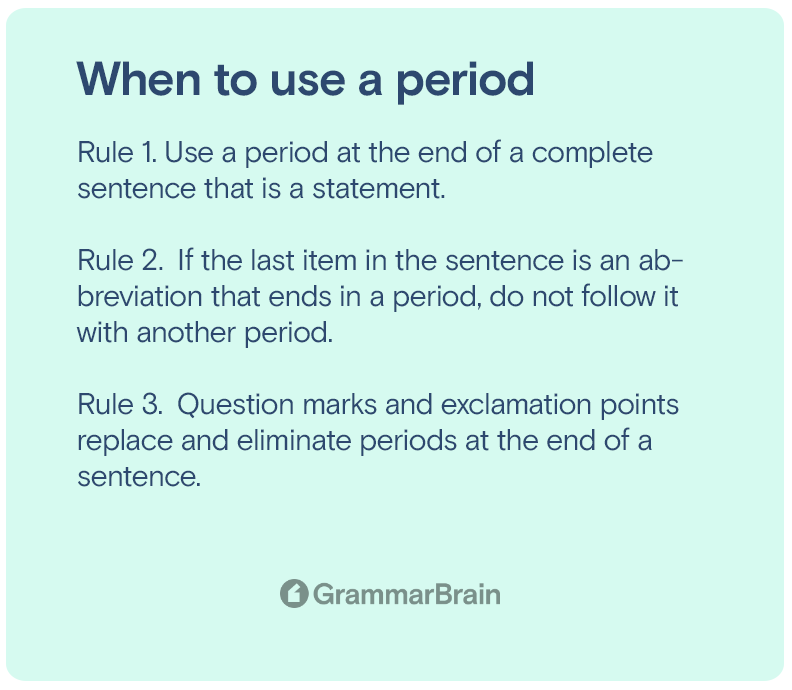Here’s when to use periods. An example sentence is as follow, “I am going to Paris tomorrow morning on official work if I finish it by evening I will return tomorrow night if not I will be back the next day”
The sentence above seems odd because it is missing punctuation marks. The correct use of punctuation will split the sentence into three meaningful sentences like this:
“I am going to Paris tomorrow morning on official work. If I finish it by evening, I will return tomorrow night. If not, I will be back the next day.”
Learn how and when to use the period in this short American English grammar guide.
What is a period?
A period is a punctuation mark that ends a sentence. It is a dot or a point we place at the bottom, after the last word, when we wish to end the sentence (like this dot). In English, we use periods at the end of a declarative sentence, and when we use abbreviations. Periods are also called full stops in UK English.
What is punctuation?
Punctuation refers to any mark, or character that we use, to make our writing clearer and easier to read.

Declarative sentences
Some examples of a period at the end of a sentence are:
- My name is Jack.
- I finished my homework quickly today. My mother said I could go outside and play.
Grammar rules when using a period
The word that follows a period begins with a capitalized letter. There are some exceptions to this rule, like certain brands such as iPhone, eBay.
It is common practice to start the following sentence with a single space after the period. Earlier, people used to use two spaces between sentences.
We can also use periods at the end of an indirect question. Some people also use it at the end of a polite request:
How to use periods
Often, people get confused when quotation marks are involved in the sentence, and many of them tend to place periods in the wrong place.
When the quotes are at the end of a sentence, the period comes within the quotes.
- Maria murmured to herself, “I will get through these tough times.”
When parentheses are used, a period should come within the parenthesis if there is a complete sentence within the parentheses.
- I completed my tasks for the day. (They were all light ones.)
- A period comes outside the parenthesis when the information inside the parenthesis is an extension of the sentence (like this period).
Abbreviations
There are some differences when it comes to using periods between American and UK English.
Many standard abbreviations end with periods:
- Doctor as Dr., and Mister as Mr., in American English.
- Street as St.
- Colonel as Col.
- H. G. Wells.
- The U.S.A. is also often written as USA or US.
| Mr. | B.A. | e.g. | A.M. or a.m. | ft. |
| Mrs. | M.A. | i.e. | P.M. or p.m. | oz. |
| Ms. | Ph.D. | etc. | Capt. | dept. |
| Dr. | R.N. | Ave. | c.o.d. | P.O. |
On the other hand, we do not use periods with:
- Doctor as Dr, Mister as Mr, Junior as Jr in UK English.
- Numerical abbreviations like 1st, 2nd, 14th,
- Units of measures like miles per gallon as mpg, revolutions per minute as rpm, and kilogram as kg.
- An exception to this is when using inches as in., where a period is commonly used.
- Acronyms like NASA, FBI, NATO, and for abbreviations that consist of capitals like BBC, AD, and BC.
- Chemical symbols like Na, Fe, H.
Lowercase abbreviations are usually written with periods:
- i.e., e.g.
Academic degrees are written with or without periods:
- BA, or M.S.
When a sentence ends with an abbreviation, it is not necessary to add an extra dot:
- The most powerful country in the world is the U.S.A.
Abbreviated names that replace words:
| NATO | IRS | CSU | NBA |
| NAACP | TV | VCR | CD-ROM |
More punctuation marks (all 26 marks)
| Symbol | Name | Example |
| . | Period | I got this at the fair. |
| ? | Question mark | How many trucks does he have? |
| ! | Exclamation point | Wow! You’re a great rider. |
| , | Comma | I like the movie, but the color grading is odd to me. |
| : | Colon | Here are some fun ideas for the party: trivia questions, shuffle board, and more. |
| ; | Semicolon | I’ll visit you once I’m done with work; that’s a promise. |
| – | Hyphen | I have double-life situations. |
| – | En dash | How long is a China-Russia fight? |
| — | Em dash | The dog—and I’m afraid of four-legged animals—was so adorable. |
| ( ) | Parentheses | His favorite team (Chicago Bulls) has a chance to win the title. |
| [ ] | Square brackets | The AP writer said “[head] of baseball operations was disappointed.” |
| { } | Curly brackets | The colors {orange, green, lilac, blue} are for the garage. |
| < > | Angle brackets | |
| “ ” | Quotation marks | Bryan called it a “great situation.” |
| ‘ | Apostrophe | Some of Susan’s clothes are missing. |
| / | Slash or Virgule | I’m ordering food/dessert/more. |
| … | Ellipses | According to the school the “president… was disappointed.” |
| * | Asterisk | *Data from The Economist |
| & | Ampersand | Tiffany & Co. |
| • | Bullet point | • Simple • Great • Awesome |
| # | Pound symbol | #1 selling |
| ~ | Tilde | Bryan owns ~10 pairs of shoes. |
| \ | Backslash | |
| @ | At symbol | mary@gmail.com |
| ^ | Caret symbol | 3^3 = 27 |
| | | Pipe symbol |
Summary
- Use a period/full stop at the end of a complete statement.
- Remember the rules and common differences for periods between US and UK English when used in abbreviations.
Common questions
When should I use the period?
Use a period for both declarative and imperative sentences. A declarative sentence makes a statement. When an imperative sentence issues a request or command.
What are the grammar rules that govern the period?
Rule 1. Use a period at the end of a complete sentence that is a statement.
Rule 2. If the last item in the sentence is an abbreviation that ends in a period, do not follow it with another period.
Rule 3. Question marks and exclamation points replace and eliminate periods at the end of a sentence.
Inside this article
Fact checked:
Content is rigorously reviewed by a team of qualified and experienced fact checkers. Fact checkers review articles for factual accuracy, relevance, and timeliness. Learn more.
Core lessons
Glossary
- Abstract Noun
- Accusative Case
- Anecdote
- Antonym
- Active Sentence
- Adverb
- Adjective
- Allegory
- Alliteration
- Adjective Clause
- Adjective Phrase
- Ampersand
- Anastrophe
- Adverbial Clause
- Appositive Phrase
- Clause
- Compound Adjective
- Complex Sentence
- Compound Words
- Compound Predicate
- Common Noun
- Comparative Adjective
- Comparative and Superlative
- Compound Noun
- Compound Subject
- Compound Sentence
- Copular Verb
- Collective Noun
- Colloquialism
- Conciseness
- Consonance
- Conditional
- Concrete Noun
- Conjunction
- Conjugation
- Conditional Sentence
- Comma Splice
- Correlative Conjunction
- Coordinating Conjunction
- Coordinate Adjective
- Cumulative Adjective
- Dative Case
- Determiner
- Declarative Sentence
- Declarative Statement
- Direct Object Pronoun
- Direct Object
- Diction
- Diphthong
- Dangling Modifier
- Demonstrative Pronoun
- Demonstrative Adjective
- Direct Characterization
- Definite Article
- Doublespeak
- False Dilemma Fallacy
- Future Perfect Progressive
- Future Simple
- Future Perfect Continuous
- Future Perfect
- First Conditional
- Irregular Adjective
- Irregular Verb
- Imperative Sentence
- Indefinite Article
- Intransitive Verb
- Introductory Phrase
- Indefinite Pronoun
- Indirect Characterization
- Interrogative Sentence
- Intensive Pronoun
- Inanimate Object
- Indefinite Tense
- Infinitive Phrase
- Interjection
- Intensifier
- Infinitive
- Indicative Mood
- Participle
- Parallelism
- Prepositional Phrase
- Past Simple Tense
- Past Continuous Tense
- Past Perfect Tense
- Past Progressive Tense
- Present Simple Tense
- Present Perfect Tense
- Personal Pronoun
- Personification
- Persuasive Writing
- Parallel Structure
- Phrasal Verb
- Predicate Adjective
- Predicate Nominative
- Phonetic Language
- Plural Noun
- Punctuation
- Punctuation Marks
- Preposition
- Preposition of Place
- Parts of Speech
- Possessive Adjective
- Possessive Determiner
- Possessive Case
- Possessive Noun
- Proper Adjective
- Proper Noun
- Present Participle
- Prefix
- Predicate



